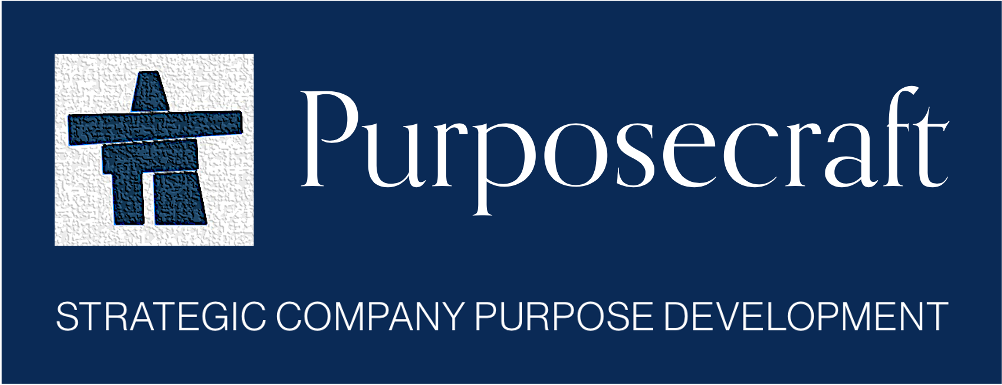“Not all purposes are created equal”
“In a survey of 2,000 CEOs’ purpose statements, 93 percent failed to state why their company is in business.
In other words: most purpose statements lack any meaningful sense of purpose”
Our multi-sector research indicates that fewer than 10% of company purpose statements are effective in driving either impact or performance.
This concurs with PwC who in 2020 reported “serious deficiencies in corporate purpose statements”, attributing the problem to a lack of top-management clarity on the actual purpose of their firm. PwC’s survey of 2,000 CEO’s found that “93 percent failed to state why their company is in business”, and “95 percent of respondents neglected to mention a core problem they endeavour to solve or to reference their organisation’s founding histories in a way that could further illuminate the purpose for which their organisation exists or why it was founded”.
The impact of this is seen clearly at the employee level: McKinsey found in 2020 that far fewer than half of company purposes are activated and aligned with employees’ motivations. Meanwhile Mercer’s 2018 global talent trends survey found that only 13% of employees say their organisation is differentiated by its purpose.
Despite the indisputable business case for purpose-driven companies, there is a gulf between these firms and those with merely a purpose statement.
Five fundamental causes of company purpose failure
For such an essentially simple concept, purpose is surprisingly easy to get wrong. Perhaps this is because it assumes a high ground from which to lead others. Company leadership is indeed behind every purpose, successful or not, but what exactly are the pitfalls? Whilst much is rightly written about the importance of properly integrating the purpose, failure usually stems from a flaw in the foundation of the purpose itself. Below we share five fatal pitfalls for leadership at the foundational stage of purpose development.
Pitfall 1: Confusing purpose with sustainability
“Profits are in no way inconsistent with purpose — in fact, profits and purpose are inextricably linked.”
Environment, Social and Governance (ESG) policy is high on the priority list for many boards today, and rightly so. The sustainability of its products and services will rapidly become a deal breaker for external stakeholders, with investors actively prioritising companies ranking well on ESG dimensions. However, the sustainability of a company’s products and services does not in itself ensure value to customers, who increasingly see this as a hygiene factor.
Many boards make the critical error of conflating purpose and ESG, and yet the two questions are symbiotic. A strong ESG policy benefits from the context of a strategic value proposition, and this is the role of company purpose. Company purpose provides a singular competitive focus for prioritising and managing the array of ESG factors available, resulting in both sustainable development, and a platform for unique value creation.
Pitfall 2: Confusing purpose with branding
Purpose has often been mistaken as an external communication challenge for the marketing department: a sticking-plaster for an indistinct corporate reputation. You may not recall the name of the insurance giant that advertises its purpose of creating a brighter future, nor its rival that claims it exists to secure your future.
A board that delegates purpose as an isolated communication task abdicates their company’s first-order strategic decision and invites the cynicism and indifference of both their customers and employees.
Pitfall 3: Claiming the industry purpose
Most industries and professions play a valuable role both for customers and broader society. This role is often mistakenly used as a proxy for company purpose: take for example, the many investment firms that claim to exist to help people meet their future financial needs, and the health insurers whose stated purpose is to improve the nation’s health.
Purpose is an unapologetically competitive discipline. Society needs resilient companies: in a competitive world this means outperforming on value creation, which requires a greater ambition than the industry purpose.
Pitfall 4: Focusing on product not outcome
A typical error is to frame the company’s purpose in terms of its product, such as the coffee brand whose stated purpose is to inspire the world to demand better coffee. This falls short in three critical respects: firstly, it restricts the ambition and future value of the firm to a finite vertical with an inevitable lifecycle; secondly, it fails to connect the world with the outcome the firm intends; thirdly it fails to inspire its employees to think imaginatively in finding new and better ways to achieve that outcome.
When Mars Petcare defined its purpose – a better world for pets – an outcome that could be served by many products and services, it propelled expansion beyond the pet-food industry into the broader playing field of pet health, with a radical shift from products to services, to become the largest and fastest-growing division of parent Mars Inc.
As an aside, you might wonder what a suitable purpose for a coffee brand might be. For the world leader, Starbucks, it is to “inspire and nurture the human spirit — one person, one cup and one neighbourhood at a time”.
Pitfall 5: Forgetting the customer
Probably the most serious mistake is to assume purpose is not commercial: a purpose that does not lead to greater customer value will do nothing for company performance and will not be sustained. Purpose is not what the firm does aside from making a profit, since profit is its lifeblood: purpose is how the firm will remain valuable.
A purpose that customers don’t value, doesn’t exist. Purpose-driven firms are careful to relate the ‘why’ of their purpose with the ‘what and how’, driving the purpose through the culture and into a highly distinct customer offering. The world’s most profitable airline in history, Southwest, exists to connect people to what’s important in their lives through friendly, reliable, and low-cost air travel. It continually tops JD Power customer satisfaction tables for long and short haul travel.
Purposecraft provides advice, consulting and training in strategic company purpose development.
